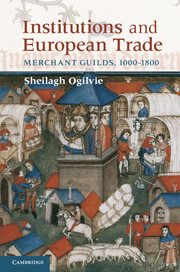Book contents
- Frontmatter
- Contents
- Acknowledgements
- 1 Merchant guilds, efficiency and social capital
- 2 What was a merchant guild?
- 3 Local merchant guilds
- 4 Alien merchant guilds and companies
- 5 Merchant guilds and rulers
- 6 Commercial security
- 7 Contract enforcement
- 8 Principal-agent problems
- 9 Information
- 10 Price volatility
- 11 Institutions, social capital and economic development
- Bibliography
- Index
9 - Information
Published online by Cambridge University Press: 05 June 2012
- Frontmatter
- Contents
- Acknowledgements
- 1 Merchant guilds, efficiency and social capital
- 2 What was a merchant guild?
- 3 Local merchant guilds
- 4 Alien merchant guilds and companies
- 5 Merchant guilds and rulers
- 6 Commercial security
- 7 Contract enforcement
- 8 Principal-agent problems
- 9 Information
- 10 Price volatility
- 11 Institutions, social capital and economic development
- Bibliography
- Index
Summary
If you wish to be counted a wise man … you ought never to let a day pass without learning something that will profit you. Be not like those who think it beneath their dignity to hear or learn from others such things even as might avail them much if they knew them. For a man must regard it as great an honor to learn as to teach, if he wishes to be considered thoroughly informed.
(‘The Activities and Habits of a Merchant’, The King's Mirror, Norway, c. 1250)Trade requires information. Buyers and sellers need to know the attributes of goods. Merchants with contracts need to know whether other parties are complying. Principals need to know what agents are doing. Traders in general want to transform uncertainty about the future into risk – to move from being unable to ascertain the probability of a particular event to being able to predict and thus prepare for it. To plan business dealings, merchants need to know about price movements, supply chains, demand conditions, political developments, military events, geographical obstacles, weather patterns, commercial techniques, foreign languages and alien customs.
The medieval and early modern trading world brought new information requirements. Trade routes – particularly as international trade expanded – were uncertain. Maps were imperfect. Transportation techniques were stretched to the limit. Communication lines were longer. Existing merchandise varied in quality. Novel goods were being discovered. Prices fluctuated wildly. Currencies differed across space and time. New methods of transferring and exchanging money were being invented.
- Type
- Chapter
- Information
- Institutions and European TradeMerchant Guilds, 1000–1800, pp. 344 - 390Publisher: Cambridge University PressPrint publication year: 2011

